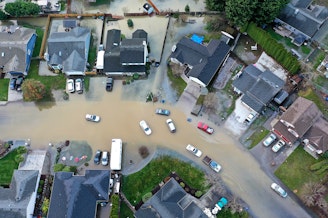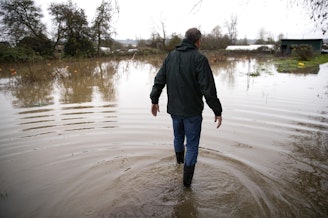This Christmas tree pesticide poisons kids, but Washington state hasn’t banned it
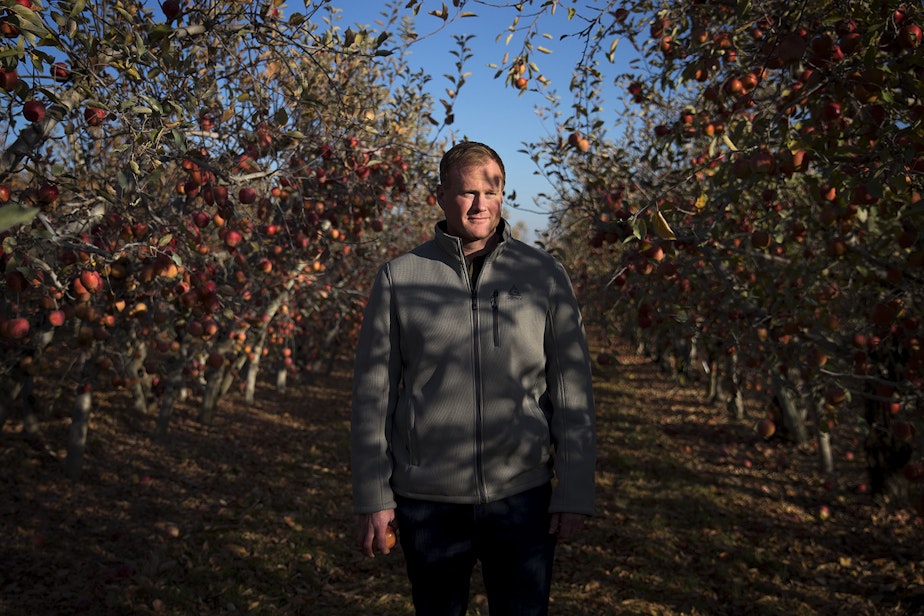
Hawaii and California banned or limited the pesticide. Gov. Jay Inslee is not considering a ban, a spokesperson said.
A pesticide sprayed on most Christmas trees has been known for a decade to cause bodily harm to children. The pesticide, called chlorpyrifos, has been crucial to Northwest crops, including apples and pears. A study looking at kids from Mercer Island, Washington, and later repeated in Atlanta, found chlorpyrifos derivatives in the urine of kids who eat conventional produce. The derivatives disappeared after the children switched to an all-organic diet. It’s unknown if the levels of chlorpyrifos the researcher found in the children were harmful or not.
Joanne Bonnar Prado, an epidemiologist with the Washington Department of Health, said if it were up to her, chlorpyrifos would be taken off the shelf.
“If you have to choose one chemical — one single chemical that’s out there in use — chlorpyrifos would be the top of my list,” Prado said.
The chemical is especially dangerous for babies and small children because it can have lasting neurological effects. Chlorpyrifos can blow from orchards into nearby houses; parents who work in orchards can transport the chemical home on their clothes and in their cars; and chlorpyrifos can make its way into developing fetuses through umbilical cord blood.
Children with more chlorpyrifos in their blood at birth and in early childhood scored lower on memory, verbal comprehension, and reasoning tests. They also had lower IQs and higher rates of ADHD and impulsive behavior than children exposed to less chlorpyrifos.
Sponsored
Because of chlorpyrifos’ health effects, the EPA phased it out of household use in 2000 — but it is still allowed in agriculture.
The Environmental Protection Agency nearly banned the chemical because of its potential harm to children and farmworkers. That was before President Donald Trump took office. His administration reversed course on a ban, rejecting the recommendations of the agency’s scientists.
Hawaii and California banned or limited the pesticide; Washington state has not. Gov. Jay Inslee is not considering a ban, a spokesperson said. Chlorpyrifos could be banned by the courts ultimately; it is currently held up in the 9th Circuit Court of Appeals.
Dow Chemical, which introduced it in 1965 says its approved uses are safe.
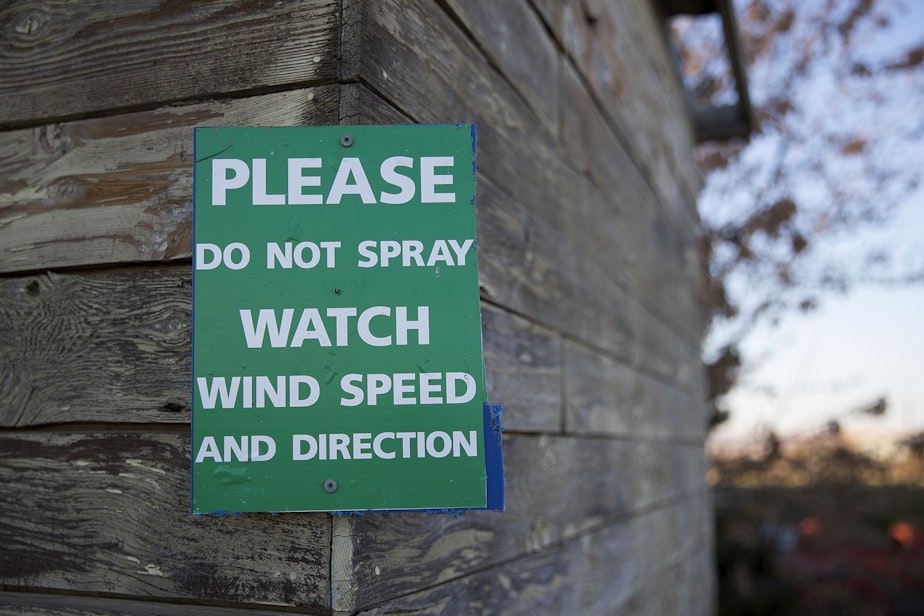
Sponsored
On Easter Sunday last year, the five Perez children hunted for Easter eggs in their backyard when they smelled something unusual.
“Plasticky and rotten eggs,” their dad, Eric Perez, recalled.
The Perez family lives in Quincy, Washington—a town in the Wenatchee Valley where acres of apples surround almost every house. Eric Perez owns a trucking company that hauls agricultural products, and his wife Mari is a dance teacher. Their house is just feet from an apple orchard. Eric Perez says he immediately suspected that the orchard had been sprayed with a pesticide while the family was away from home. “Afterwards, we all started getting sick. I think we all went to the doctor,” Perez remembered. He said their symptoms included throwing up, diarrhea, scratchy throat, difficulty breathing and stomach aches.
Washington’s Department of Agriculture investigated and found that a pesticide called chlorpyrifos had drifted onto the Perez property from the neighboring orchard.
Sponsored
When the pesticide drifts onto farm workers and farm neighbors, it can cause symptoms like the ones Perez described: nausea, abdominal cramps, vomiting, diarrhea, coughing, wheezing, and muscle weakness and twitching.
Over the past five years, dozens of complaints have been lodged against growers in Washington and Oregon for chlorpyrifos use, and there have been several confirmed cases of chlorpyrifos drift.
Julie Madison-Jamil, who lives in Oregon on a lot surrounded by Christmas tree farms, was among those who filed a complaint.
She and her husband moved to this farm outside Oregon City in 2016, with dreams of a small organic egg and vegetable farm. But then, mysteriously, dozens of their birds died. Madison-Jamil blamed the pesticides sprayed on the surrounding Christmas trees. “You can taste it. You can smell it,” she said, when spraying happens nearby. It burns her throat and gives her headaches.
Last year, test results showed that the pesticide had drifted onto her property.
Sponsored
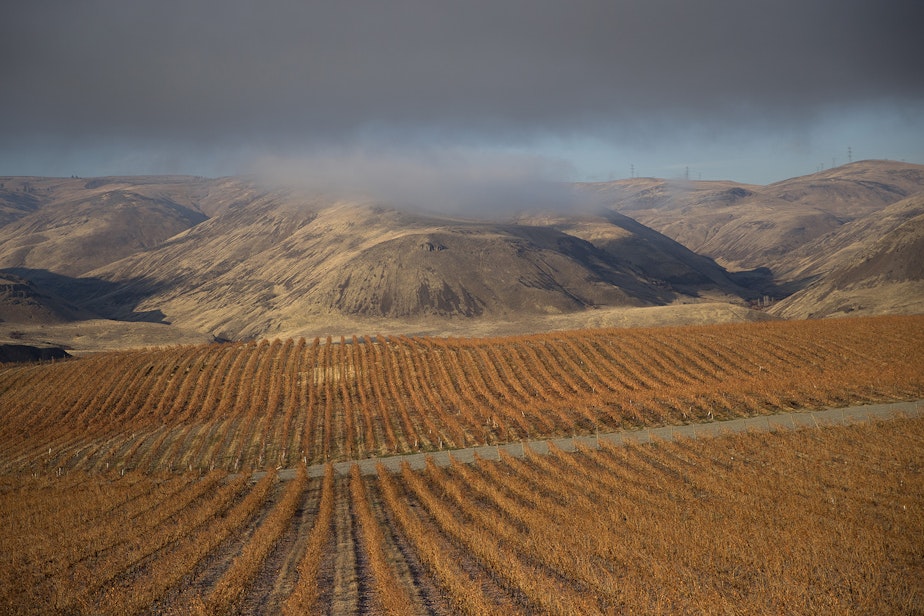
The Pacific Northwest produces about 8 million Christmas trees every year, shipping them across the country and internationally. Without the ability to control aphids or other pests, stands of grand, noble or Douglas fir could become grayed, blackened, twisted or otherwise blemished enough that some could be unsellable.
Farmers say chlorpyrifos is a useful, inexpensive pesticide that fights devastating pests while keeping produce and Christmas trees affordable. They say the emphasis should be on safe use: minimizing pesticide drift instead of banning chlorpyrifos outright.
Christmas tree growers use chlorpyrifos to kill aphids and other pests that can leave trees black, gnarled and unsellable.
Sponsored
It is unclear how much residue remains on products like apples, pears, and Christmas trees once they enter the home.
Because Christmas trees are most often sprayed in the spring, industry experts say the likelihood of exposure to any residue by the time it reaches a family’s living room is extremely low. Some growers do suspect purchased trees still contain pesticides, but whether there is exposure from pesticide residue on Christmas trees inside homes has not been studied thoroughly. Sean Gilbert is a fifth-generation farmer in Yakima, Washington. He has a couple thousand acres of apples and also grows nectarines, apricots, cherries and pears.
About three-quarters of Gilbert’s apple acres are conventional — which means he sometimes uses chlorpyrifos.
“It will primarily go after a pest called scale,” he explained. “Scale irritates the skin of the apple and creates bright red spots on it. It would look like it had the measles.”
Betsy Beers, an entomologist at Washington State University who studies pest management, said there are alternatives to chlorpyrifos, but they’re more expensive. And, she added, regulatory requirements are such that new pesticides are entering the market very slowly.
“When I first started here many years ago, there were lots of new pesticides in the pipeline,” she remembered. “Today, that pipeline has really slowed to a trickle. We can’t count on there being an effective replacement coming anytime soon.”
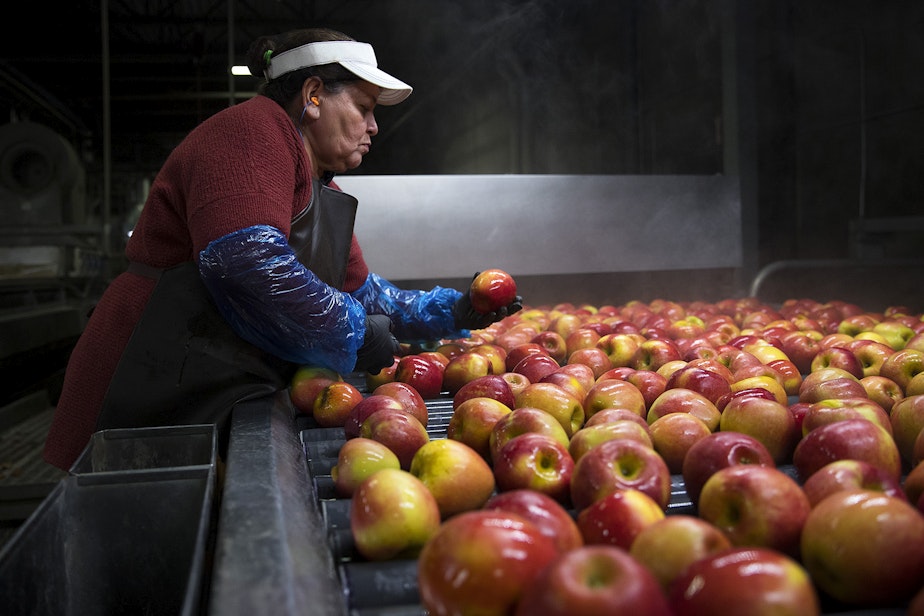
In March 2017, then-EPA administrator Scott Pruitt rejected his own scientists’ advice and decided not to ban chlorpyrifos. Since then, the EPA and environmentalists have been fighting it out in the courts.
Washington Attorney General Bob Ferguson has joined other states in a lawsuit asking the EPA to ban chlorpyrifos — but no Washington legislator has introduced a bill that would institute a state-level ban.
Back in Wenatchee, Eric Perez took matters into his own hands.
“That guy was spraying my house and my kids,” he said. “I saw my kids go to the doctor so many times. I failed them as a parent by not, you know, putting my foot down and going, ‘Dude, you need to stop.’”
So Perez bought the orchard next to his house.
Now, it’s farmed organically.



